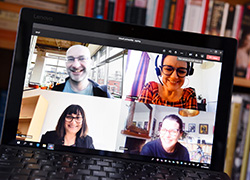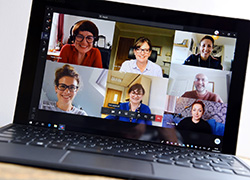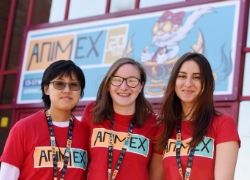Course overview
Computer games facilities
See the facilities you use when you study computer games at Teesside University
You develop key transferable skills such as advanced presentation skills and are encouraged to creatively experiment with ways of conveying concepts and information.
The course develops your prototyping skills and knowledge in relation to game design to prepare you for a career in the games industry. You gain advanced practical skills required for complex mission design and implementation, as well as the ability to create advanced gameplay scenarios and professional design documents. You learn to tackle complex game development scenarios and apply advanced game management techniques, ensuring projects are organised in a professional manner from pre-production through production, delivery and project closure. You study advanced concepts relating to optimisation of games and create a game prototype with consideration for industry level design roles.
The final semester involves the master’s project. This is a large 60 credit module where you can design and develop a large project based on research. It has been designed to allow you to further develop and display the advanced skills and knowledge you have acquired over the programme. There are three routes you can choose from to gain an MA Games Design:
- full-time - 2 years with advanced practice (September and January start)
- full-time - 1 year (September start) or 16 months (January start)
- part-time - 2 years.
Course details
Course structure
Core modules
This module aims to discuss advanced concepts and theories involved in game mechanics design and implementation. The pre-production stages of game design will be examined with a strong focus on game mechanics and their role in designing an engaging and immersive gaming experience.
You will develop creative game design pitches which communicate concept, mechanics, gameplay, and user experience with clarity and as visually as possible. These pitches will be developed into proofs of concept.
This module aims to analyse advanced concepts and theories involved in advanced game mission design and implementation. The pre-production stages of mission design will be examined with a strong focus on creating an engaging and immersive gaming experience.
You will develop creative preproduction documentation which will communicate the mission concept, mechanics, gameplay, and user experience with clarity and as visually as possible. You will go on to create the game mission in a games engine using a level editor toolset. The product will be a playable prototype as a proof of concept.
You learn advanced concepts surrounding the area of game optimisation. This includes work done on game mechanics, level design and implementation of systems and aesthetic polishing. The post-production stages of polishing and fixing game stability and functionality will be fully explored and the concepts of game design will be examined in terms of making a fun and engaging experience while meeting technical quality criterions.
You develop technical skills both in terms of working with a prototype, as well as working to improve and iterate upon an already existing version of a prototype before porting it successfully onto another platform.
You explore the prototyping aspects of computer games development within a contemporary game engine, focusing on the principles of design and programming. You look at different ways of creating, designing and developing interactive content specific to modern gaming platforms. Working in small teams, you develop a real game from concept through to fully demonstrable prototype.
This module introduces you to a broad range of skills and techniques required for effective project management and the role of the project manager in the day-to-day management of teams and production.
It will also be a focus for understanding how to manage projects from pre-production, through production, delivery and project closure. It will develop your knowledge and understanding of techniques for project scoping, project planning, budgeting, and project software, whilst also developing an understanding of the role of the project manager throughout the project process.
The module will introduce tools for project management, such as Microsoft Project, Trello, Shotgun, Basecamp and other cloud based solutions for collaboration.
This module is a large scale piece of individual coursework, completed under the supervision of a project supervisor and a second reader. The project parameters are agreed on an individual basis by you and your supervisor with the aim to produce a substantial artefact related to the games field. The process begins with a pre-production document and culminates in a written reflective report, and a viva where the artefact is presented and defended.
Build upon fundamental concepts involved in the creation of a game prototype with reference to industry-level design roles.
You examine the contrast between the creation of a strong core mechanic and how it can be expanded upon through player learning, subtractive design and variety to provide longevity. Your learning concludes by providing an accessible, engaging, and substantial gameplay experience informed by playtesting.
You enhance your skills inside and outside of a contemporary game engine, inspired by the structure of relevant titles, you plan tasks from a macro and micro perspective prior to development.
Advanced practice (2 year full-time MA only)
The internship options are:
Vocational: spend one semester working full-time in industry or on placement in the University. We have close links with a range of national and international companies who could offer you the chance to develop your knowledge and professional skills in the workplace through an internship. Although we cannot guarantee internships, we will provide you with practical support and advice on how to find and secure your own internship position. A vocational internship is a great way to gain work experience and give your CV a competitive edge.
Research: develop your research and academic skills by undertaking a research internship within the University. Experience working as part of a research team in an academic setting. Ideal for those who are interested in a career in research or academia.
Modules offered may vary.
How you learn
You learn about concepts and methods primarily through keynote lectures and tutorials using case studies and examples. Lectures include presentations from guest speakers from industry. Critical reflection is key to successful problem solving and essential to the creative process. You develop your own reflective practice at an advanced level, then test and assess your solutions against criteria that you develop in the light of your research.
How you are assessed
The programme assessment strategy has been designed to assess your subject specific knowledge, cognitive and intellectual skills and transferable skills applicable to the workplace. The strategy ensures that you are provided with formative assessment opportunities throughout the programme which support your summative assessments. There is a mix of practical work (usually in the form of a portfolio), poster and viva presentations, written reports. Formative feedback is typically given during lectures, tutorials and summative feedback using on-line methods. The assessments can include individual or group work. The assessment criteria, where appropriate, will include assessment of presentation skills and report writing.
Entry requirements
You will normally have a first degree (2.2 minimum) in a relevant subject such as games design, games development, games programming or computer science.
In addition, international students will require IELTS 6.0 or equivalent.
For general information please see our overview of entry requirements
International applicants can find out what qualifications they need by visiting Your Country
Employability
Career opportunities
We prepare you for a career in industry. In addition to your taught classes, we create opportunities for you to meet and network with our industry partners through events such as our ExpoSeries, which showcases student work to industry. ExpoTees is the pinnacle of the ExpoSeries with over 100 businesses from across the UK coming to the campus to meet our exceptional students, with a view to recruitment.
We also offer start-up business support to help you develop your own business in games through our innovative Power UP Indie Games Accelerator.
Information for international applicants
Qualifications
International applicants - find out what qualifications you need by selecting your country below.
Select your country:
Useful information
Visit our international pages for useful information for non-UK students and applicants.

 Teesside University partnership provides a boost for games development industry
Teesside University partnership provides a boost for games development industry Leading UK games development studio to grow opportunities for students with Teesside University partnership
Leading UK games development studio to grow opportunities for students with Teesside University partnership Expansion plans announced for major animation and games festival
Expansion plans announced for major animation and games festival